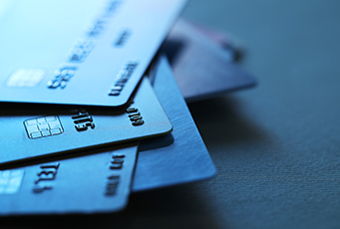With the sound of holiday bells in the air, don’t turn a pleasant ring into a dreadful ding! Overspending on credit cards for all that shopping and merriment could turn that nice ring into a credit score “ding” in January.
So the holiday shopping hustle and bustle will be coming to a close in a couple of weeks and you are likely considering your New Year’s resolutions for 2015. If paying down debt or borrowing for a new house or vehicle is one of them, read on. It is important to know what might negatively, or positively, impact your credit score.
FICO Credit-Scoring System
The FICO system is the most widely used for determining credit scores. FICO scores range between 300 and 850 points, depending on how well individuals handle credit. The FICO scoring is used in about ten billion financial decisions worldwide every year. Their scoring system, however, still remains a secret. Some information that they do share includes the five components that impact our score and the weight of each: Payment History (35%)
Payment History (35%)- Credit Utilization or “Amounts Owed” (30%)
- Length of Credit History (15%)
- New Credit (10%)
- Credit Mix or “Types of Credit” (10%)
You may also find it interesting to know that if you have a high credit score, the factors that negatively impact your credit will hit you harder than those with a lower score. For example, if your credit score is 780 and you pay a bill late by thirty days or more, your score will drop 90 to 100 points. However, someone with a score of 680 may only see their credit score decline between 60 and 90 points.
Negative Impact to Credit Score
Below are a few of the actions that will negatively impact your credit score:- Late or missed payments. Whether it is your credit card, mortgage or auto loan, or utility bills, the biggest concern for a potential lender is whether you are timely with your payments. Therefore, your most recent payment history will have the most impact on your credit score.
- Maxing available credit. Experts say that you should keep your borrowing to 75% or less of the amount you are eligible to utilize. For example, if you have a credit card with a credit limit of $5,000, your outstanding balance should never exceed $3,750. The more credit cards that you have maxed out, the lower your credit rating will be.
- Requests for more credit. Each time you apply for a credit card, any type of loan, or a line of credit, the finance company will access your credit report. If your credit report is checked frequently by potential lenders, it will negatively impact your credit score. If those 0% interest offers at department stores are appealing, be sensible as to when and how often they are used. Each time you take advantage of these offers, you are opening a new credit line and your credit report is being checked.
- Lien or foreclosure. A vendor placing a lien against your home or foreclosure by a mortgage company could impact your credit score by as much as 160 points. If you are unable to meet a payment schedule, attempt to modify it before it gets to this point.
- Bankruptcy. You do the most serious damage to a credit score when you file for bankruptcy. This can lower your score by as much as 240 points. And, it takes seven to ten years to get bankruptcy off your credit report!
- Unemployment. Unemployment itself will not affect your credit score; nor will losing your job. However, being unemployed for an extended period of time could lead to financial instability, increased debt, and defaulting on payments which would ultimately impact your credit score.





